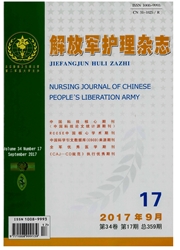

 中文摘要:
中文摘要:
目的旨在调查临床护士对患者身体约束的认知水平、所持态度及行为表现,探讨其相关性和分析其影响因素。方法2015年1-6月,便利抽样法选取3所三级医院186名护士为研究对象,采用一般资料问卷和患者身体约束知识、态度、行为问卷进行问卷调查。结果护士对患者身体约束的认知评分为(8.67±1.54)分,其中"患者身体约束的护理原则"的答对率最高(76.60%),"身体约束适用情况"的答对率最低(48.17%)。护士对患者身体约束持中立态度,为(26.51±3.31)分;身体约束行为表现较为恰当,为(38.53±3.22)分。在对患者身体约束的认知、态度及行为上,近3年是否参加过身体约束继续教育的护士的得分差异均有统计学意义(均P〈0.05)。护士对患者身体约束的认知与态度、态度与行为之间呈正相关(r=0.343,P〈0.01;r=0.196,P〈0.05)。结论护士应提升自身对患者身体约束的认知水平,积极寻找替代措施;医院的护理管理者应规范身体约束的使用,并提供针对患者身体约束的继续教育。
 英文摘要:
英文摘要:
Objective To investigate nurses' perceptions,attitudes and practice of physical restraint,in order to explore the correlation among them and find out impact factors.Methods From January to June2015,totally 186 nurses selected by convenience sampling from three hospitals were investigated with questionnaire.Results Nurses' perception about physical restraint was(8.67±1.54).The correct response rate of nursing principles of physical restraints was scored the highest(76.60%);and the indications of physical restraint were scored the lowest(48.17%).Nurses' attitude towards physical restraint was neutral(26.51±3.31).Nurses' practice of physical restraints was relatively appropriate(38.53±3.22).The significant differences showed in nurses' perception,attitude,and practices of physical restraint between nurses participating the physical restraint education program or not in nearly three years(all P〈0.05).Nurses' perceptions and attitudes(r= 0.343,P〈0.01),attitudes and practice(r= 0.196,P〈0.05)of the physical constraints were significantly positively correlated.Conclusions Nurses should improve their knowledge of physical restraint and ability of use restraint alternative intervention in practice;nursing managers should make standard physical restrain tregulations and provide physical restraint education.
 同期刊论文项目
同期刊论文项目
 同项目期刊论文
同项目期刊论文
 期刊信息
期刊信息
